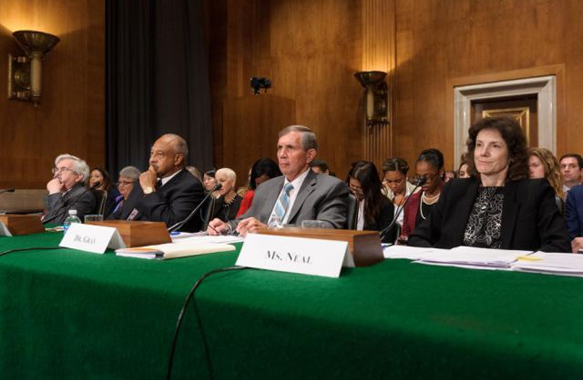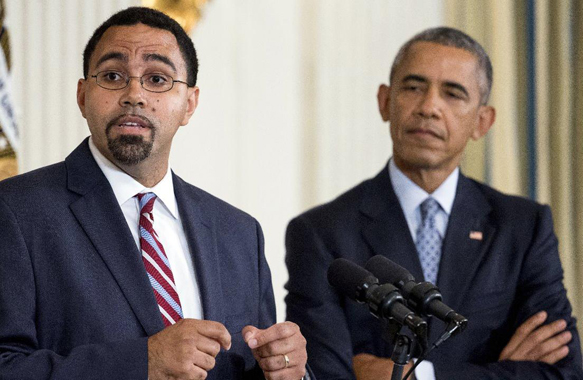Photograph; Schenk Elementary School fourth-grader Meadow Corfits solves a math problem on her classroom’s chalkboard in this September 2013 file photo.
By MATTHEW DeFOUR and MOLLY BECK | Originally Published at Wisconsin State Journal. January 28, 2014
Wisconsin’s lowest-performing public schools would be forced to close or reopen as charter schools and the state’s 2-year-old accountability report card would be revamped under a bill unveiled Monday.
The proposal also would require testing for taxpayer-subsidized students at private voucher schools while barring the lowest-performing schools from enrolling new voucher students. Participating private schools also could test all students for accountability purposes.
“We’re going to start holding anybody who gets public money accountable for getting results. That is the bottom line,” said Sen. Luther Olsen, R-Ripon, chairman of the Senate Education Committee, which plans to vote on the amended bill Thursday.
The bill makes several changes to the state’s K-12 school accountability system — including assigning schools letter grades — which itself recently replaced a decade-old system under the federal No Child Left Behind law.
The proposal is an updated version of bills introduced last September by Olsen and Rep. Steve Kestell, R-Elkhart Lake, chairman of the Assembly Education Committee. It would go into effect for the 2015-16 school year.
The Senate version received a public hearing on Sept. 12. Since then, legislative staff have been working on changes with the Department of Public Instruction, representing public schools, and voucher and charter school lobbyists.
Wisconsin Education Association Council president Betsy Kippers, a Racine teacher, said the “fingerprints of the voucher and privately run charter lobbyists are all over this.”
Olsen said his hope is the bill gets a vote in the Senate when it next meets on Feb. 11.
DPI officials and legislative leadership were reviewing the proposal Monday night and declined comment on the details. A spokesman for Senate Majority Leader Scott Fitzgerald, R-Juneau, said he would wait to see what happens in committee before saying when it would come up for a vote.
Assembly Speaker Robin Vos, R-Rochester, wants to take up an accountability bill this session, spokeswoman Kit Beyer said.
“He supports more accountability measures for every school that receives public funding,” Beyer said.
Gov. Scott Walker would like to see a school accountability bill on his desk that he could sign by the end of this term, spokesman Tom Evenson said. He did not have a specific comment on the latest draft.
Among the changes, schools would receive letter grades on an A-F grading scale, rather than the current five phrases ranging from “significantly exceeds expectations” to “fails to meet expectations.”
The grades would continue to be based on a numeric score ranging from 0-100, but a different formula than the one DPI created in 2012 would be used for calculating the score.
The current formula bases the score on test results broken down into four categories — achievement, growth, closing scores between minority and majority student groups and college readiness — with deductions for poor test participation, dropout and graduation rates.
The new formula still uses the achievement and achievement gap score categories. But it would use a method of calculating student growth developed at UW-Madison, known as “value-added,” which seeks to evaluate school performance while accounting for student demographics. It also would no longer double-count third-grade reading scores, eighth-grade math scores and dropout rates as part of the calculation.
Olsen said the changes in the formula are intended to address one of the biggest flaws of the current report cards — that schools with the best scores tend to be the ones with the fewest low-income students.
“You can’t get good grades because you’re lucky to have a whole bunch of high-income students,” Olsen said. “That’s not fair.”
Under the proposal, schools that receive an F for three consecutive years, or a combination of Ds and Fs with weak growth scores for five consecutive years, would be closed or turned over to a private charter management organization. Eligible organizations would have to operate existing charter schools with better test results than district schools.
“We’re not going to allow some fly-by-night folks to come in here and run schools,” Olsen said. “You have to have a proven track record.”
A school district could not employ any of the staff at the charter school, though it would have to pay at least 90 percent of its own per-pupil cost for each student attending the charter school.
Kippers said the plan removes DPI oversight. Currently, DPI can direct districts to change instruction or create an improvement council at poorly performing schools.
Public charter schools with similar poor performance would have their charters revoked and wouldn’t be allowed to participate in the voucher program if they reopen as private schools.
Private voucher schools that don’t perform would not be allowed to accept new students or reopen as a charter school. But those schools would have the option of having students take the state test or a different one.
Kippers said a previous version of the bill kicked poor voucher schools out of the program, leaving taxpayers “still on the hook.”
The bill also requires that the lowest-performing 5 percent of schools in the state automatically receive an F rating through the 2018-19 school year.
Madison School Board president Ed Hughes, speaking after a reporter summarized the legislation, said he is confident the board would oppose any measures that would remove their authority over district schools.
“I don’t know what the grading scale will be, but in general, people on school boards are against proposals that take away school board authority,” he said. “If there is a way to grade schools that can realistically take into account different demographics of schools, that’s one thing, but that’s still attaching Draconian consequences to what are inevitably somewhat arbitrary scores.”
Contact Matthew DeFour at mdefour@madison.com or 608-252-6144; contact Molly Beck at mbeck@madison.com or 608-252-6135.












Leave A Comment